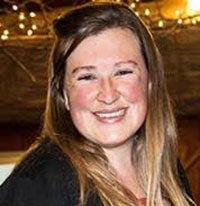Erin Spring
 Title: Assistant Professor, University of Calgary
Title: Assistant Professor, University of Calgary
Email: erin.spring@ucalgary.ca
Degrees:
- Ph.D. (Faculty of Education, University of Cambridge)
- M.Phil (Faculty of Education, University of Cambridge)
- B.Ed (Faculty of Education, Queen’s University)
- B.A. (English, Trent University)
Biography:
Erin is an Assistant Professor in the Werklund School of Education at the University of Calgary. Between 2014-2017 she was a Postdoctoral Fellow in the Institute for Child and Youth Studies at the University of Lethbridge. Broadly speaking, Erin’s interdisciplinary research focuses on young people’s texts and cultures. Drawing on a range of methodological approaches, including reading discussion groups, photo-elicitation, and map-making, Erin’s research seeks to understand the ways in which young people make sense of their identities through reading, writing, and art. Her research projects are united thematically by a shared investment in stories and storytelling as a way of articulating identity development, with a particular focus on the influence of place. Her ongoing objective as a settler scholar is to collaborate with communities, including schools, to ask and answer questions that matter to them, facilitating social change, building capacity, and promoting student wellbeing.
Current Projects:
Six Seasons of the Asiniskow Ithiniwak: Reclamation, Regeneration, and ReconciliationI am currently a co-applicant on the Curriculum Team of a SSHRC Partnership Grant (2017-2024). The Project Director is Dr. Mavis Reimer of the University of Winnipeg. Building on the SSHRC-funded project that produced Pīsim Finds Her Miskanow (2013), this collaboration works with northern Manitoba’s Asiniskow Ithiniwak (Rocky Cree) to reclaim their history by revitalizing their stories of cultural identity. The project involves numerous partners from Rocky Cree communities, universities, educational organizations, museums, and schools.
Being Human: Deconstructing Representations of Evolution in Children’s Literature
I am currently collaborating on a project with Dr. Eve Tandoi from the University of Gloucestershire (UK). Our project seeks to understand the ways in which engaging with picture books that represent a scientific understanding of evolution affect young people’s shared sense of what is means to be human. Our project asks: how do young people draw on a scientific understanding of evolution and a historical understanding of events leading to its genesis to construct a meaningful sense of belonging in time and space? Through this work, we hope to explore the effect that reading and responding to picture books has on two groups of young people in Canada and the United Kingdom, and to suggest ways in which picture books may be used as a means of sensitively approaching the scientific concept of evolution within the classroom.
Raising Spirit: The Opokaa’sin Digital Storytelling Project
Collaboration with Opokaa’sin Early Intervention Society and Institute for Child and Youth Studies (University of Lethbridge). Principal Investigators: Tanya Pace Crosschild (Opokaa’sin), Jan Newberry (Anthropology, U of L) & Kristine Alexander (History, U of L). Funded by PolicyWise for Children and Families and the Community Foundation of Lethbridge’s Canada 150 fund.
You can read more about this project.
The Blackfoot Adolescent Reading Project
Collaboration with middle school on the Kainai Blood reserve in southern Alberta
Funded by Diversity Grant (Children’s Literature Association), Frances E. Russell Grant (IBBY Canada), and the Institute for Child and Youth Studies (U of L)
“Our Torontos are Different Places”: young adult fiction and young adult readers’ constructions of place within and beyond the text
Funding provided by the Cambridge Commonwealth Trust, Homerton College, and Cambridge Faculty of Education
Awarded UKLA student research prize for outstanding doctoral dissertation
Research Interests:
I research and publish in the areas of education and child and youth studies. I teach courses at the undergraduate and graduate level in areas such as: interdisciplinary learning, multiliteracies, language and literacy, children’s literature, Indigenous education, and research methods.
Publications:
- Spring, E., & Fox, A. (2018). “I never read anything like that before”: mapping the identities of Blackfoot readers. International Journal of Child, Youth, and Family Studies, 10(2), 51-66.
- Spring, E. (2018). “I think I was born with a suitcase”: Blackfoot adolescent readers’ responses to Sherman Alexie’s The Absolutely True Diary of a Part-time Indian.” In Young People Reading: Empirical Research Across International Contexts, ed. Evelyn Arizpe & Gabrielle Cliff Hodges. Routledge. 106-120.
- Spring, E. (2017). Empirical approaches to place and the construction of adolescent identities. In The Edinburgh Companion to Children’s Literature, ed. Maria Nikolajeva & Clémentine Beauvais. Edinburgh University Press. 112-134.
- Spring, E. (2017). Without Manifest, none of the book would have happened: place, identity, and the positioning of Canadian adolescent readers as literary critics. Children’s Literature in Education, 49(2), 101-118.
- Spring, E. (2016). Everyone here knows a Junior: Blackfoot children and their texts. Bookbird: an International Children’s Literature Journal, 51(1), 55-60.
- Spring, E. (2016). The experiences of two migrant readers: freedom, restriction, and the navigation of adolescent space. Jeunesse: Young People, Texts, Cultures, 8(1), 227-247.
- Spring, E. (2016). Where are you from?: locating the young adult self within and beyond the text. Children’s Geographies, 14(3), 356-371.
- Spring, E. (2015). Place and identity in children’s and young adult fiction. In Nancy Worth, Claire Dwyer, & Tracy Skelton (Eds.), Geographies of Identities and Subjectivities, Volume 4 (429-450). Singapore: Springer.
- Charlton, E., Cliff Hodges, G., Pointon. P., Nikolajeva, M., Spring. E., Taylor, L., & Wyse, D. (2014). My Place: exploring children’s place-related identities through reading and writing. Education 3-13: International Journal of Primary, Elementary and Early Years Education, 42(2), 154-170.
